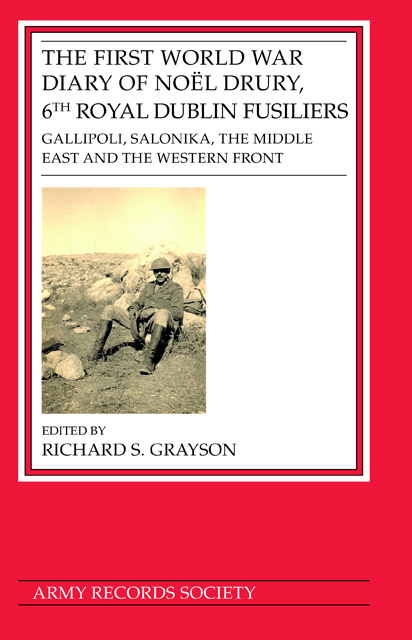 First World War Diary of Noël Drury, 6th Royal Dublin Fusiliers
First World War Diary of Noël Drury, 6th Royal Dublin Fusiliers Book contents
- Frontmatter
- Miscellaneous Frontmatter
- Contents
- List of Illustrations
- Acknowledgements
- List of Abbreviations
- Introduction
- 1 Volunteering and Training, September 1914–July 1915
- 2 The Voyage to the Dardanelles, July–August 1915
- 3 Gallipoli: Landing at Suvla Bay and the Next Ten Days, 7–17 August 1915
- 4 Gallipoli: Digging In, 18 August–October
- 5 The Serbian Front and the Battle of Kosturino, October–December 1915
- 6 The Salonika Front and Hospital, December 1915–September 1917
- 7 Egypt and Palestine, September–December 1917
- 8 Defending Jerusalem and the Battle of Tell ‘Asur, December 1917–July 1918
- 9 France, July–11 November 1918
- 10 Armistice, 12 November 1918– 11 March 1919
- Appendix 1 6th Royal Dublin Fusiliers leaving home for service overseas, 10 July 1915
- Appendix 2 The Effects of the Gallipoli Campaign on the 6th Royal Dublin Fusiliers
- Appendix 3 Officers of the 6th Royal Dublin Fusiliers at Hastière-sur-Meuse, Nov 1918
- Biographies
- Bibliography
- Index
4 - Gallipoli: Digging In, 18 August–October
Published online by Cambridge University Press: 14 June 2023
- Frontmatter
- Miscellaneous Frontmatter
- Contents
- List of Illustrations
- Acknowledgements
- List of Abbreviations
- Introduction
- 1 Volunteering and Training, September 1914–July 1915
- 2 The Voyage to the Dardanelles, July–August 1915
- 3 Gallipoli: Landing at Suvla Bay and the Next Ten Days, 7–17 August 1915
- 4 Gallipoli: Digging In, 18 August–October
- 5 The Serbian Front and the Battle of Kosturino, October–December 1915
- 6 The Salonika Front and Hospital, December 1915–September 1917
- 7 Egypt and Palestine, September–December 1917
- 8 Defending Jerusalem and the Battle of Tell ‘Asur, December 1917–July 1918
- 9 France, July–11 November 1918
- 10 Armistice, 12 November 1918– 11 March 1919
- Appendix 1 6th Royal Dublin Fusiliers leaving home for service overseas, 10 July 1915
- Appendix 2 The Effects of the Gallipoli Campaign on the 6th Royal Dublin Fusiliers
- Appendix 3 Officers of the 6th Royal Dublin Fusiliers at Hastière-sur-Meuse, Nov 1918
- Biographies
- Bibliography
- Index
Summary
Late evening on 17 August the 6th Royal Dublin Fusiliers were sent to ‘A’ Beach for rest. This was a welcome move for Drury who was beginning to suffer from dysentery, and it also provided an opportunity for reinforcements to settle in the battalion, whose strength was now 487 men and just four officers. On 21 August the 10th (Irish) Division was once again sent to the front, at Lala Baba, but only in reserve as the 29th Division and 11th (Northern) Division attacked Scimitar Hill and W Hill. They came under fire but saw no major action. The next six weeks saw them rotating in and out of trenches and attempts to advance in the area ground to a halt. Trench warfare ensued. During this time, Drury was again ill and left the battalion for treatment on 27 August, returning three days later.
As September began, nights were colder, but during the day flies were still a persistent problem. Daytime work was primarily focused on improving the line, but there was also burying of the dead with efforts made to retrieve bodies from No Man's Land. Drury was promoted to Captain and given command of ‘B’ and ‘C’ Companies in mid-September. He noted, ‘These are very quiet days, and except for the morning and evening “hate” there is hardly any shooting.’ Shell fire and unexpected encounters with individual Turks provided shocks. Religious services became important as a coping mechanism, along with material comforts from home. Drury noted that sermons were ‘but just the simple truths one hears from the cradle, which now seem invested with a new meaning’. Drury noticed how the Anglican and Roman Catholic chaplains got on well and that many Catholic soldiers went to hear the former, just as he had himself visited the latter. He reflected, ‘If the two creeds could come together at home as they do here, what a different story there would be.’
The most dangerous situation faced by the 6th Royal Dublin Fusiliers was the result of a misunderstanding. On 27 September, great cheering was heard from British lines and that led to heavy machine gun and rifle fire in response from the Turks.
- Type
- Chapter
- Information
- First World War Diary of Noël Drury, 6th Royal Dublin FusiliersGallipoli, Salonika, the Middle East and the Western Front, pp. 71 - 94Publisher: Boydell & BrewerPrint publication year: 2022


